Tesco's Global Reward Strategies: A Comparative Study
VerifiedAdded on 2023/01/11
|10
|2743
|79
Report
AI Summary
This report provides a comparative analysis of Tesco's reward management policies in the UK (parent country) and India (host country). It examines the competitive salary, holiday benefits, flexible benefits, colleague club card, and long service awards offered by Tesco India, comparing them to the benefits available in the UK. The report identifies potential issues in staff management within the Indian context, such as cultural differences, labor market challenges, and organizational design issues, offering recommendations to mitigate these challenges. The analysis emphasizes the importance of adapting reward strategies to local contexts to ensure employee satisfaction and retention, concluding that while Tesco India's benefits are competitive, continuous improvement and adaptation are necessary for effective global reward management.
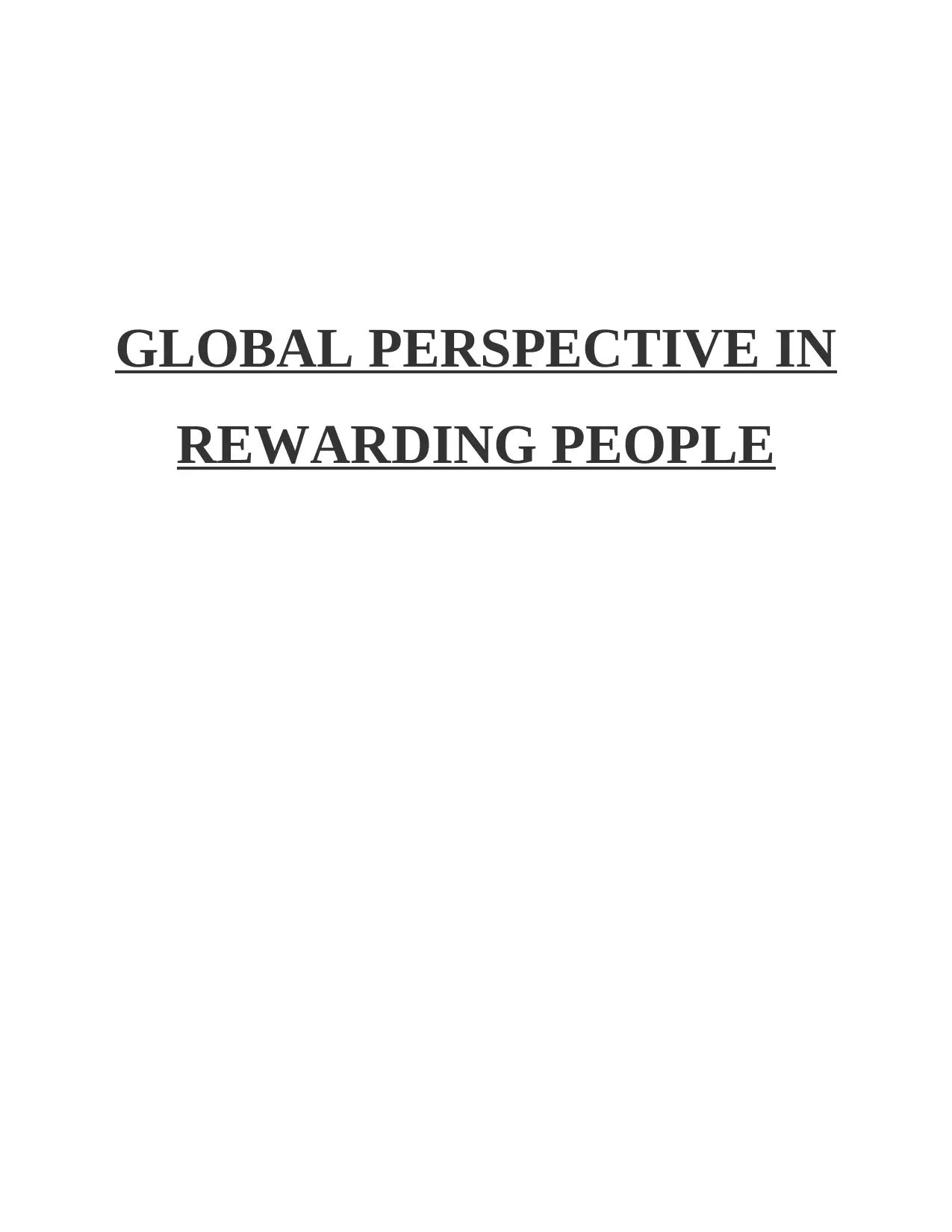
GLOBAL PERSPECTIVE IN
REWARDING PEOPLE
REWARDING PEOPLE
Paraphrase This Document
Need a fresh take? Get an instant paraphrase of this document with our AI Paraphraser
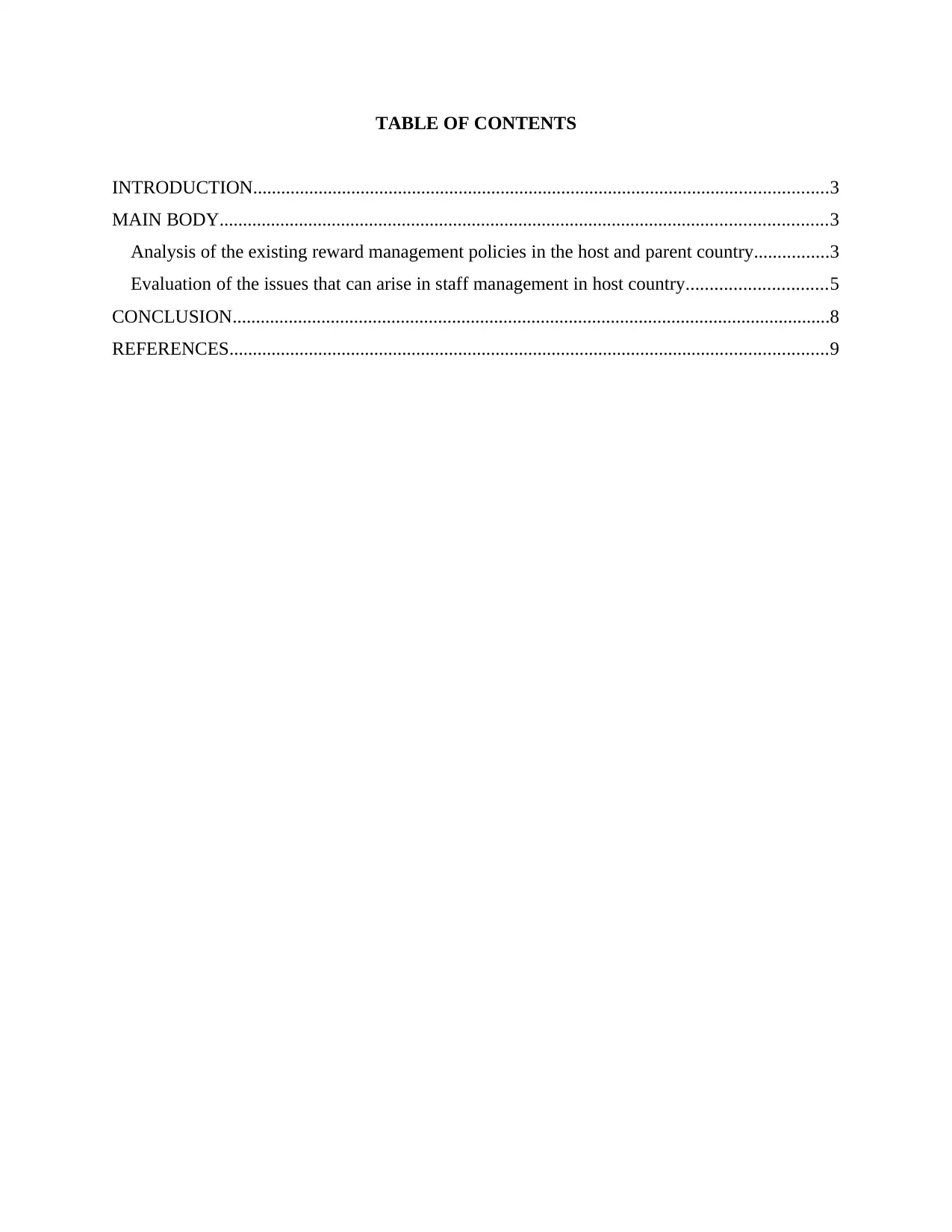
TABLE OF CONTENTS
INTRODUCTION...........................................................................................................................3
MAIN BODY..................................................................................................................................3
Analysis of the existing reward management policies in the host and parent country................3
Evaluation of the issues that can arise in staff management in host country..............................5
CONCLUSION................................................................................................................................8
REFERENCES................................................................................................................................9
INTRODUCTION...........................................................................................................................3
MAIN BODY..................................................................................................................................3
Analysis of the existing reward management policies in the host and parent country................3
Evaluation of the issues that can arise in staff management in host country..............................5
CONCLUSION................................................................................................................................8
REFERENCES................................................................................................................................9
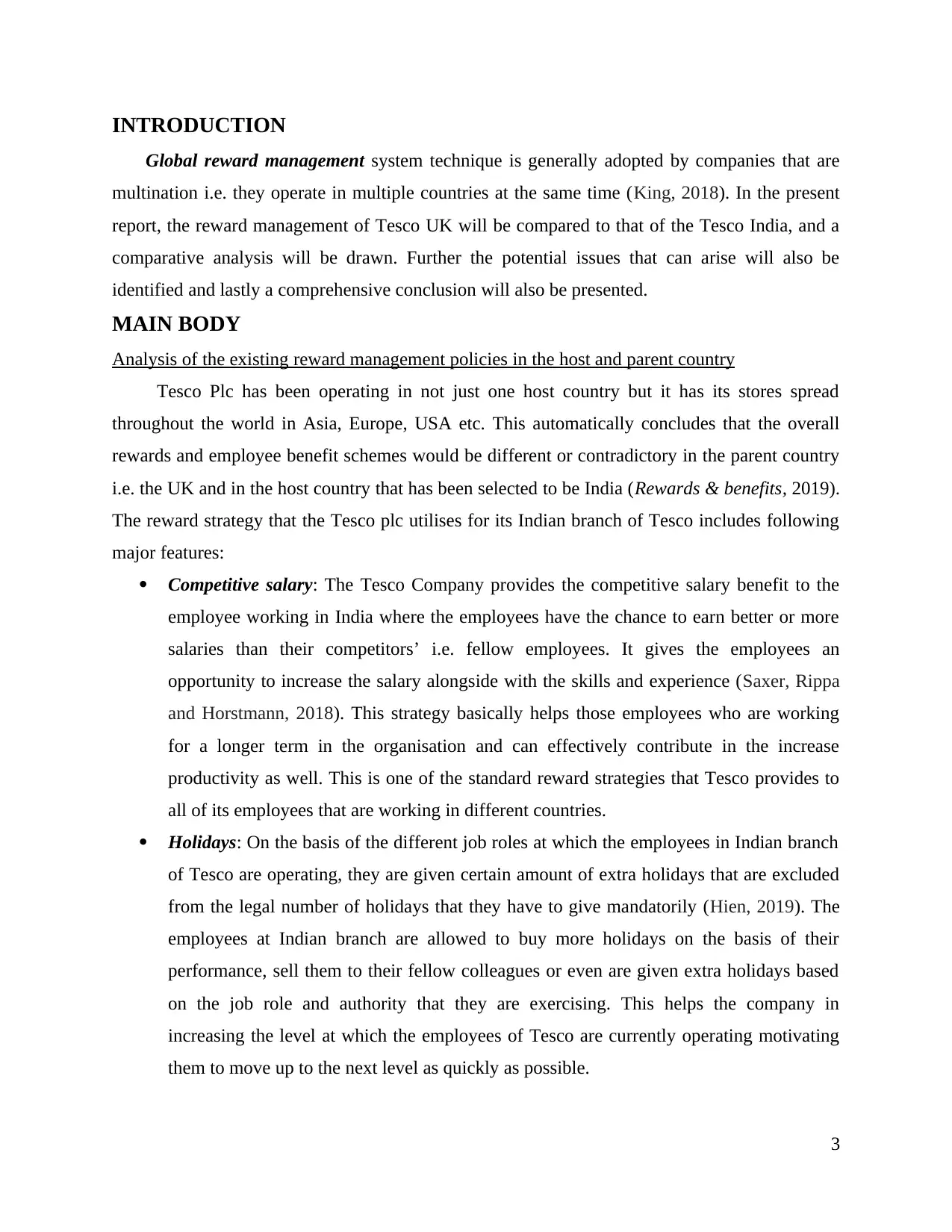
INTRODUCTION
Global reward management system technique is generally adopted by companies that are
multination i.e. they operate in multiple countries at the same time (King, 2018). In the present
report, the reward management of Tesco UK will be compared to that of the Tesco India, and a
comparative analysis will be drawn. Further the potential issues that can arise will also be
identified and lastly a comprehensive conclusion will also be presented.
MAIN BODY
Analysis of the existing reward management policies in the host and parent country
Tesco Plc has been operating in not just one host country but it has its stores spread
throughout the world in Asia, Europe, USA etc. This automatically concludes that the overall
rewards and employee benefit schemes would be different or contradictory in the parent country
i.e. the UK and in the host country that has been selected to be India (Rewards & benefits, 2019).
The reward strategy that the Tesco plc utilises for its Indian branch of Tesco includes following
major features:
Competitive salary: The Tesco Company provides the competitive salary benefit to the
employee working in India where the employees have the chance to earn better or more
salaries than their competitors’ i.e. fellow employees. It gives the employees an
opportunity to increase the salary alongside with the skills and experience (Saxer, Rippa
and Horstmann, 2018). This strategy basically helps those employees who are working
for a longer term in the organisation and can effectively contribute in the increase
productivity as well. This is one of the standard reward strategies that Tesco provides to
all of its employees that are working in different countries.
Holidays: On the basis of the different job roles at which the employees in Indian branch
of Tesco are operating, they are given certain amount of extra holidays that are excluded
from the legal number of holidays that they have to give mandatorily (Hien, 2019). The
employees at Indian branch are allowed to buy more holidays on the basis of their
performance, sell them to their fellow colleagues or even are given extra holidays based
on the job role and authority that they are exercising. This helps the company in
increasing the level at which the employees of Tesco are currently operating motivating
them to move up to the next level as quickly as possible.
3
Global reward management system technique is generally adopted by companies that are
multination i.e. they operate in multiple countries at the same time (King, 2018). In the present
report, the reward management of Tesco UK will be compared to that of the Tesco India, and a
comparative analysis will be drawn. Further the potential issues that can arise will also be
identified and lastly a comprehensive conclusion will also be presented.
MAIN BODY
Analysis of the existing reward management policies in the host and parent country
Tesco Plc has been operating in not just one host country but it has its stores spread
throughout the world in Asia, Europe, USA etc. This automatically concludes that the overall
rewards and employee benefit schemes would be different or contradictory in the parent country
i.e. the UK and in the host country that has been selected to be India (Rewards & benefits, 2019).
The reward strategy that the Tesco plc utilises for its Indian branch of Tesco includes following
major features:
Competitive salary: The Tesco Company provides the competitive salary benefit to the
employee working in India where the employees have the chance to earn better or more
salaries than their competitors’ i.e. fellow employees. It gives the employees an
opportunity to increase the salary alongside with the skills and experience (Saxer, Rippa
and Horstmann, 2018). This strategy basically helps those employees who are working
for a longer term in the organisation and can effectively contribute in the increase
productivity as well. This is one of the standard reward strategies that Tesco provides to
all of its employees that are working in different countries.
Holidays: On the basis of the different job roles at which the employees in Indian branch
of Tesco are operating, they are given certain amount of extra holidays that are excluded
from the legal number of holidays that they have to give mandatorily (Hien, 2019). The
employees at Indian branch are allowed to buy more holidays on the basis of their
performance, sell them to their fellow colleagues or even are given extra holidays based
on the job role and authority that they are exercising. This helps the company in
increasing the level at which the employees of Tesco are currently operating motivating
them to move up to the next level as quickly as possible.
3
You're viewing a preview
Unlock full access by subscribing today!
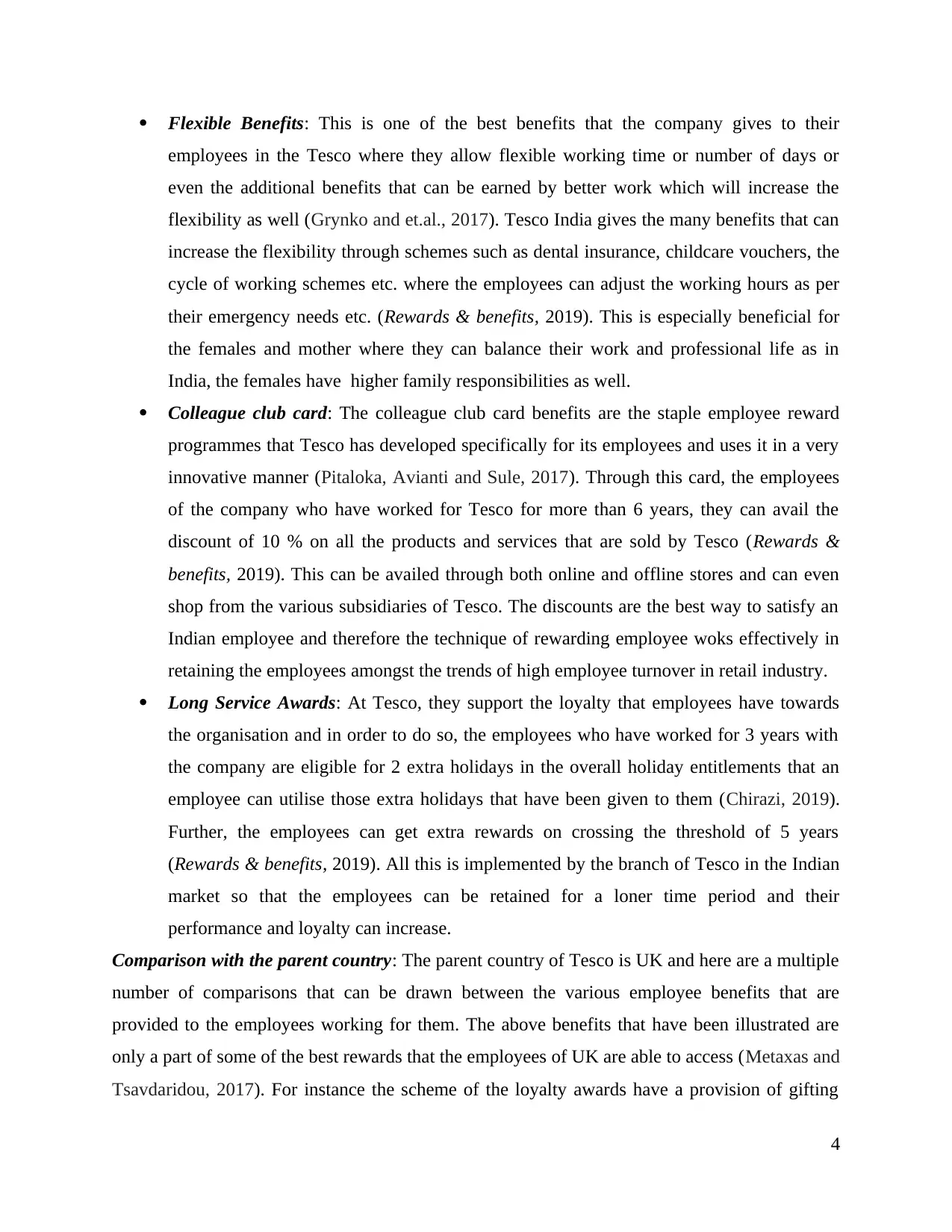
Flexible Benefits: This is one of the best benefits that the company gives to their
employees in the Tesco where they allow flexible working time or number of days or
even the additional benefits that can be earned by better work which will increase the
flexibility as well (Grynko and et.al., 2017). Tesco India gives the many benefits that can
increase the flexibility through schemes such as dental insurance, childcare vouchers, the
cycle of working schemes etc. where the employees can adjust the working hours as per
their emergency needs etc. (Rewards & benefits, 2019). This is especially beneficial for
the females and mother where they can balance their work and professional life as in
India, the females have higher family responsibilities as well.
Colleague club card: The colleague club card benefits are the staple employee reward
programmes that Tesco has developed specifically for its employees and uses it in a very
innovative manner (Pitaloka, Avianti and Sule, 2017). Through this card, the employees
of the company who have worked for Tesco for more than 6 years, they can avail the
discount of 10 % on all the products and services that are sold by Tesco (Rewards &
benefits, 2019). This can be availed through both online and offline stores and can even
shop from the various subsidiaries of Tesco. The discounts are the best way to satisfy an
Indian employee and therefore the technique of rewarding employee woks effectively in
retaining the employees amongst the trends of high employee turnover in retail industry.
Long Service Awards: At Tesco, they support the loyalty that employees have towards
the organisation and in order to do so, the employees who have worked for 3 years with
the company are eligible for 2 extra holidays in the overall holiday entitlements that an
employee can utilise those extra holidays that have been given to them (Chirazi, 2019).
Further, the employees can get extra rewards on crossing the threshold of 5 years
(Rewards & benefits, 2019). All this is implemented by the branch of Tesco in the Indian
market so that the employees can be retained for a loner time period and their
performance and loyalty can increase.
Comparison with the parent country: The parent country of Tesco is UK and here are a multiple
number of comparisons that can be drawn between the various employee benefits that are
provided to the employees working for them. The above benefits that have been illustrated are
only a part of some of the best rewards that the employees of UK are able to access (Metaxas and
Tsavdaridou, 2017). For instance the scheme of the loyalty awards have a provision of gifting
4
employees in the Tesco where they allow flexible working time or number of days or
even the additional benefits that can be earned by better work which will increase the
flexibility as well (Grynko and et.al., 2017). Tesco India gives the many benefits that can
increase the flexibility through schemes such as dental insurance, childcare vouchers, the
cycle of working schemes etc. where the employees can adjust the working hours as per
their emergency needs etc. (Rewards & benefits, 2019). This is especially beneficial for
the females and mother where they can balance their work and professional life as in
India, the females have higher family responsibilities as well.
Colleague club card: The colleague club card benefits are the staple employee reward
programmes that Tesco has developed specifically for its employees and uses it in a very
innovative manner (Pitaloka, Avianti and Sule, 2017). Through this card, the employees
of the company who have worked for Tesco for more than 6 years, they can avail the
discount of 10 % on all the products and services that are sold by Tesco (Rewards &
benefits, 2019). This can be availed through both online and offline stores and can even
shop from the various subsidiaries of Tesco. The discounts are the best way to satisfy an
Indian employee and therefore the technique of rewarding employee woks effectively in
retaining the employees amongst the trends of high employee turnover in retail industry.
Long Service Awards: At Tesco, they support the loyalty that employees have towards
the organisation and in order to do so, the employees who have worked for 3 years with
the company are eligible for 2 extra holidays in the overall holiday entitlements that an
employee can utilise those extra holidays that have been given to them (Chirazi, 2019).
Further, the employees can get extra rewards on crossing the threshold of 5 years
(Rewards & benefits, 2019). All this is implemented by the branch of Tesco in the Indian
market so that the employees can be retained for a loner time period and their
performance and loyalty can increase.
Comparison with the parent country: The parent country of Tesco is UK and here are a multiple
number of comparisons that can be drawn between the various employee benefits that are
provided to the employees working for them. The above benefits that have been illustrated are
only a part of some of the best rewards that the employees of UK are able to access (Metaxas and
Tsavdaridou, 2017). For instance the scheme of the loyalty awards have a provision of gifting
4
Paraphrase This Document
Need a fresh take? Get an instant paraphrase of this document with our AI Paraphraser
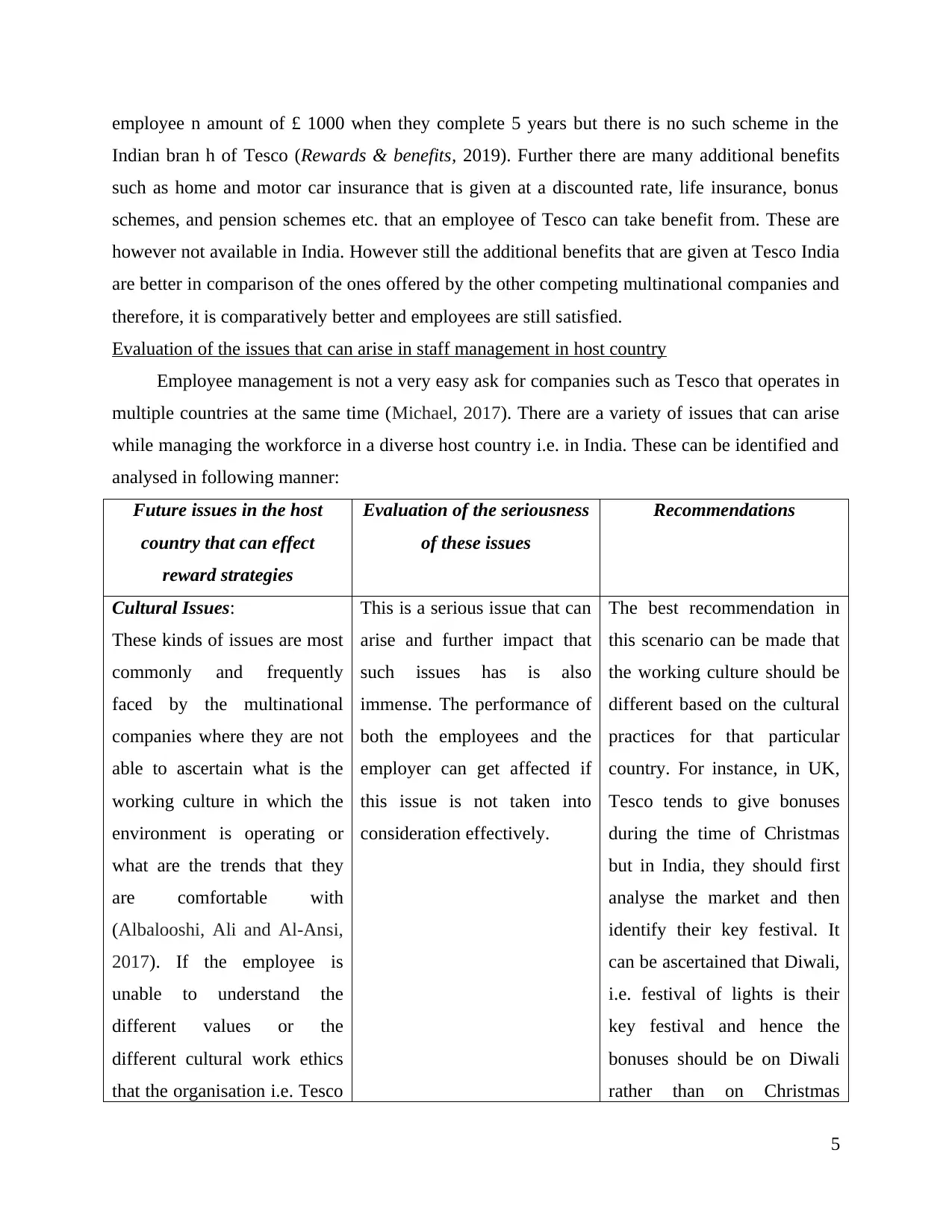
employee n amount of £ 1000 when they complete 5 years but there is no such scheme in the
Indian bran h of Tesco (Rewards & benefits, 2019). Further there are many additional benefits
such as home and motor car insurance that is given at a discounted rate, life insurance, bonus
schemes, and pension schemes etc. that an employee of Tesco can take benefit from. These are
however not available in India. However still the additional benefits that are given at Tesco India
are better in comparison of the ones offered by the other competing multinational companies and
therefore, it is comparatively better and employees are still satisfied.
Evaluation of the issues that can arise in staff management in host country
Employee management is not a very easy ask for companies such as Tesco that operates in
multiple countries at the same time (Michael, 2017). There are a variety of issues that can arise
while managing the workforce in a diverse host country i.e. in India. These can be identified and
analysed in following manner:
Future issues in the host
country that can effect
reward strategies
Evaluation of the seriousness
of these issues
Recommendations
Cultural Issues:
These kinds of issues are most
commonly and frequently
faced by the multinational
companies where they are not
able to ascertain what is the
working culture in which the
environment is operating or
what are the trends that they
are comfortable with
(Albalooshi, Ali and Al-Ansi,
2017). If the employee is
unable to understand the
different values or the
different cultural work ethics
that the organisation i.e. Tesco
This is a serious issue that can
arise and further impact that
such issues has is also
immense. The performance of
both the employees and the
employer can get affected if
this issue is not taken into
consideration effectively.
The best recommendation in
this scenario can be made that
the working culture should be
different based on the cultural
practices for that particular
country. For instance, in UK,
Tesco tends to give bonuses
during the time of Christmas
but in India, they should first
analyse the market and then
identify their key festival. It
can be ascertained that Diwali,
i.e. festival of lights is their
key festival and hence the
bonuses should be on Diwali
rather than on Christmas
5
Indian bran h of Tesco (Rewards & benefits, 2019). Further there are many additional benefits
such as home and motor car insurance that is given at a discounted rate, life insurance, bonus
schemes, and pension schemes etc. that an employee of Tesco can take benefit from. These are
however not available in India. However still the additional benefits that are given at Tesco India
are better in comparison of the ones offered by the other competing multinational companies and
therefore, it is comparatively better and employees are still satisfied.
Evaluation of the issues that can arise in staff management in host country
Employee management is not a very easy ask for companies such as Tesco that operates in
multiple countries at the same time (Michael, 2017). There are a variety of issues that can arise
while managing the workforce in a diverse host country i.e. in India. These can be identified and
analysed in following manner:
Future issues in the host
country that can effect
reward strategies
Evaluation of the seriousness
of these issues
Recommendations
Cultural Issues:
These kinds of issues are most
commonly and frequently
faced by the multinational
companies where they are not
able to ascertain what is the
working culture in which the
environment is operating or
what are the trends that they
are comfortable with
(Albalooshi, Ali and Al-Ansi,
2017). If the employee is
unable to understand the
different values or the
different cultural work ethics
that the organisation i.e. Tesco
This is a serious issue that can
arise and further impact that
such issues has is also
immense. The performance of
both the employees and the
employer can get affected if
this issue is not taken into
consideration effectively.
The best recommendation in
this scenario can be made that
the working culture should be
different based on the cultural
practices for that particular
country. For instance, in UK,
Tesco tends to give bonuses
during the time of Christmas
but in India, they should first
analyse the market and then
identify their key festival. It
can be ascertained that Diwali,
i.e. festival of lights is their
key festival and hence the
bonuses should be on Diwali
rather than on Christmas
5
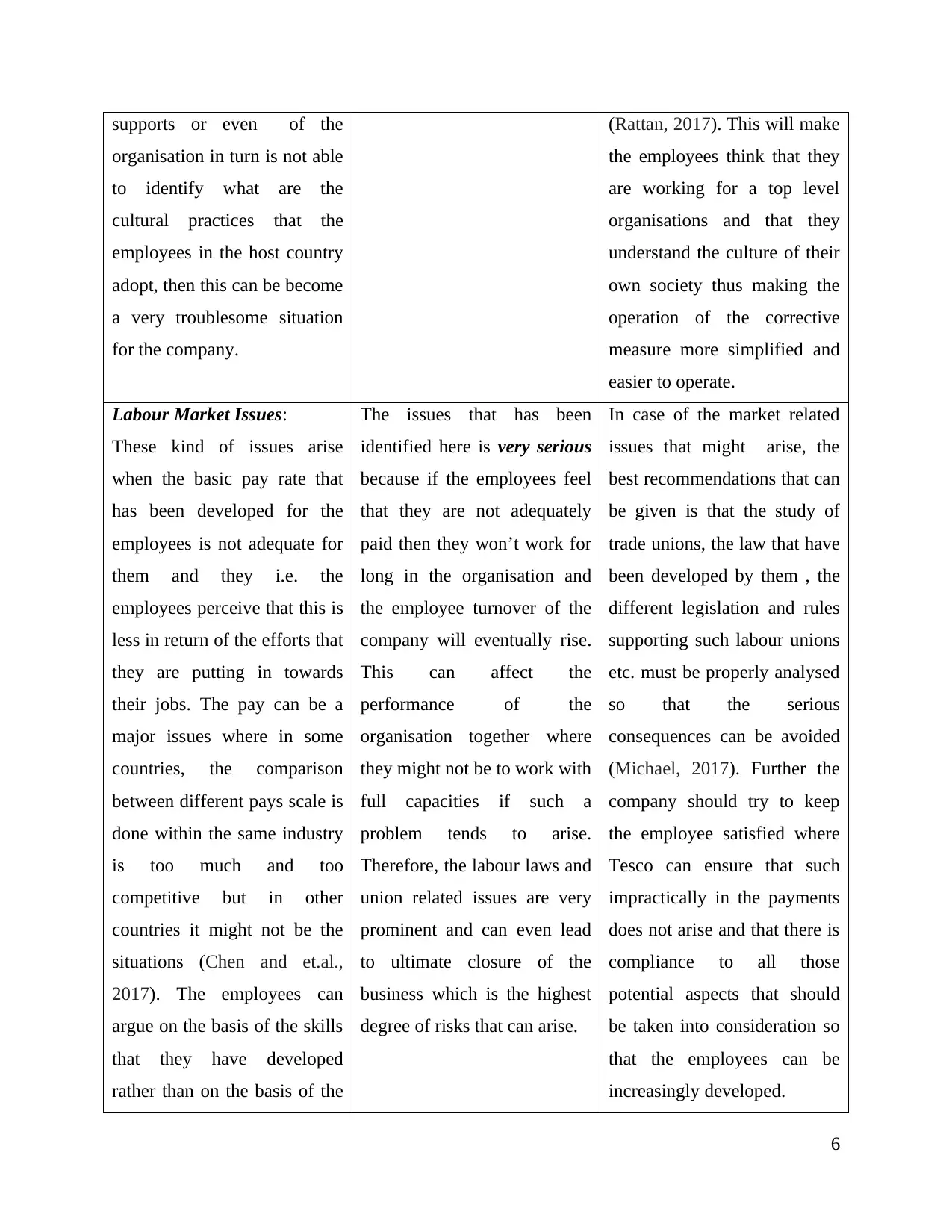
supports or even of the
organisation in turn is not able
to identify what are the
cultural practices that the
employees in the host country
adopt, then this can be become
a very troublesome situation
for the company.
(Rattan, 2017). This will make
the employees think that they
are working for a top level
organisations and that they
understand the culture of their
own society thus making the
operation of the corrective
measure more simplified and
easier to operate.
Labour Market Issues:
These kind of issues arise
when the basic pay rate that
has been developed for the
employees is not adequate for
them and they i.e. the
employees perceive that this is
less in return of the efforts that
they are putting in towards
their jobs. The pay can be a
major issues where in some
countries, the comparison
between different pays scale is
done within the same industry
is too much and too
competitive but in other
countries it might not be the
situations (Chen and et.al.,
2017). The employees can
argue on the basis of the skills
that they have developed
rather than on the basis of the
The issues that has been
identified here is very serious
because if the employees feel
that they are not adequately
paid then they won’t work for
long in the organisation and
the employee turnover of the
company will eventually rise.
This can affect the
performance of the
organisation together where
they might not be to work with
full capacities if such a
problem tends to arise.
Therefore, the labour laws and
union related issues are very
prominent and can even lead
to ultimate closure of the
business which is the highest
degree of risks that can arise.
In case of the market related
issues that might arise, the
best recommendations that can
be given is that the study of
trade unions, the law that have
been developed by them , the
different legislation and rules
supporting such labour unions
etc. must be properly analysed
so that the serious
consequences can be avoided
(Michael, 2017). Further the
company should try to keep
the employee satisfied where
Tesco can ensure that such
impractically in the payments
does not arise and that there is
compliance to all those
potential aspects that should
be taken into consideration so
that the employees can be
increasingly developed.
6
organisation in turn is not able
to identify what are the
cultural practices that the
employees in the host country
adopt, then this can be become
a very troublesome situation
for the company.
(Rattan, 2017). This will make
the employees think that they
are working for a top level
organisations and that they
understand the culture of their
own society thus making the
operation of the corrective
measure more simplified and
easier to operate.
Labour Market Issues:
These kind of issues arise
when the basic pay rate that
has been developed for the
employees is not adequate for
them and they i.e. the
employees perceive that this is
less in return of the efforts that
they are putting in towards
their jobs. The pay can be a
major issues where in some
countries, the comparison
between different pays scale is
done within the same industry
is too much and too
competitive but in other
countries it might not be the
situations (Chen and et.al.,
2017). The employees can
argue on the basis of the skills
that they have developed
rather than on the basis of the
The issues that has been
identified here is very serious
because if the employees feel
that they are not adequately
paid then they won’t work for
long in the organisation and
the employee turnover of the
company will eventually rise.
This can affect the
performance of the
organisation together where
they might not be to work with
full capacities if such a
problem tends to arise.
Therefore, the labour laws and
union related issues are very
prominent and can even lead
to ultimate closure of the
business which is the highest
degree of risks that can arise.
In case of the market related
issues that might arise, the
best recommendations that can
be given is that the study of
trade unions, the law that have
been developed by them , the
different legislation and rules
supporting such labour unions
etc. must be properly analysed
so that the serious
consequences can be avoided
(Michael, 2017). Further the
company should try to keep
the employee satisfied where
Tesco can ensure that such
impractically in the payments
does not arise and that there is
compliance to all those
potential aspects that should
be taken into consideration so
that the employees can be
increasingly developed.
6
You're viewing a preview
Unlock full access by subscribing today!
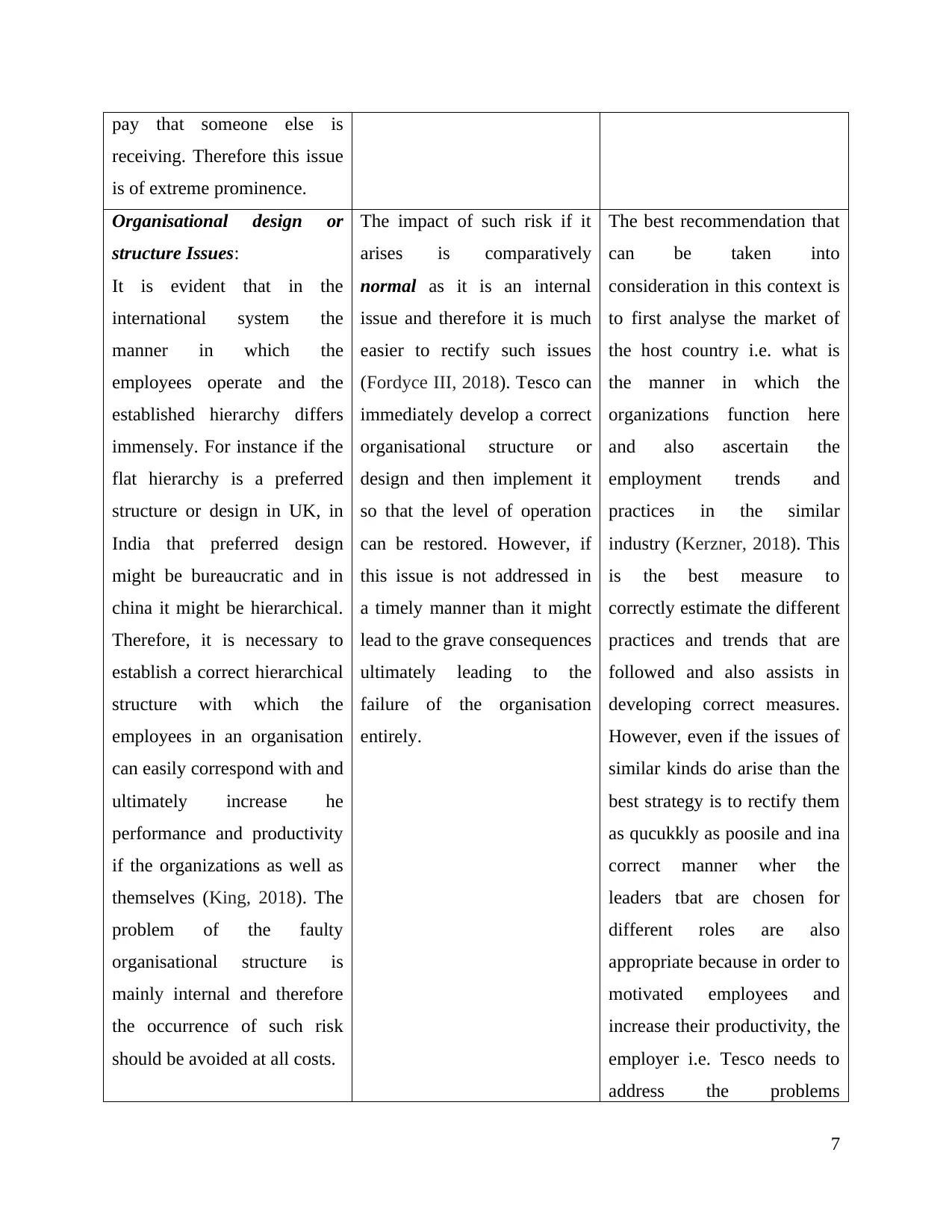
pay that someone else is
receiving. Therefore this issue
is of extreme prominence.
Organisational design or
structure Issues:
It is evident that in the
international system the
manner in which the
employees operate and the
established hierarchy differs
immensely. For instance if the
flat hierarchy is a preferred
structure or design in UK, in
India that preferred design
might be bureaucratic and in
china it might be hierarchical.
Therefore, it is necessary to
establish a correct hierarchical
structure with which the
employees in an organisation
can easily correspond with and
ultimately increase he
performance and productivity
if the organizations as well as
themselves (King, 2018). The
problem of the faulty
organisational structure is
mainly internal and therefore
the occurrence of such risk
should be avoided at all costs.
The impact of such risk if it
arises is comparatively
normal as it is an internal
issue and therefore it is much
easier to rectify such issues
(Fordyce III, 2018). Tesco can
immediately develop a correct
organisational structure or
design and then implement it
so that the level of operation
can be restored. However, if
this issue is not addressed in
a timely manner than it might
lead to the grave consequences
ultimately leading to the
failure of the organisation
entirely.
The best recommendation that
can be taken into
consideration in this context is
to first analyse the market of
the host country i.e. what is
the manner in which the
organizations function here
and also ascertain the
employment trends and
practices in the similar
industry (Kerzner, 2018). This
is the best measure to
correctly estimate the different
practices and trends that are
followed and also assists in
developing correct measures.
However, even if the issues of
similar kinds do arise than the
best strategy is to rectify them
as qucukkly as poosile and ina
correct manner wher the
leaders tbat are chosen for
different roles are also
appropriate because in order to
motivated employees and
increase their productivity, the
employer i.e. Tesco needs to
address the problems
7
receiving. Therefore this issue
is of extreme prominence.
Organisational design or
structure Issues:
It is evident that in the
international system the
manner in which the
employees operate and the
established hierarchy differs
immensely. For instance if the
flat hierarchy is a preferred
structure or design in UK, in
India that preferred design
might be bureaucratic and in
china it might be hierarchical.
Therefore, it is necessary to
establish a correct hierarchical
structure with which the
employees in an organisation
can easily correspond with and
ultimately increase he
performance and productivity
if the organizations as well as
themselves (King, 2018). The
problem of the faulty
organisational structure is
mainly internal and therefore
the occurrence of such risk
should be avoided at all costs.
The impact of such risk if it
arises is comparatively
normal as it is an internal
issue and therefore it is much
easier to rectify such issues
(Fordyce III, 2018). Tesco can
immediately develop a correct
organisational structure or
design and then implement it
so that the level of operation
can be restored. However, if
this issue is not addressed in
a timely manner than it might
lead to the grave consequences
ultimately leading to the
failure of the organisation
entirely.
The best recommendation that
can be taken into
consideration in this context is
to first analyse the market of
the host country i.e. what is
the manner in which the
organizations function here
and also ascertain the
employment trends and
practices in the similar
industry (Kerzner, 2018). This
is the best measure to
correctly estimate the different
practices and trends that are
followed and also assists in
developing correct measures.
However, even if the issues of
similar kinds do arise than the
best strategy is to rectify them
as qucukkly as poosile and ina
correct manner wher the
leaders tbat are chosen for
different roles are also
appropriate because in order to
motivated employees and
increase their productivity, the
employer i.e. Tesco needs to
address the problems
7
Paraphrase This Document
Need a fresh take? Get an instant paraphrase of this document with our AI Paraphraser
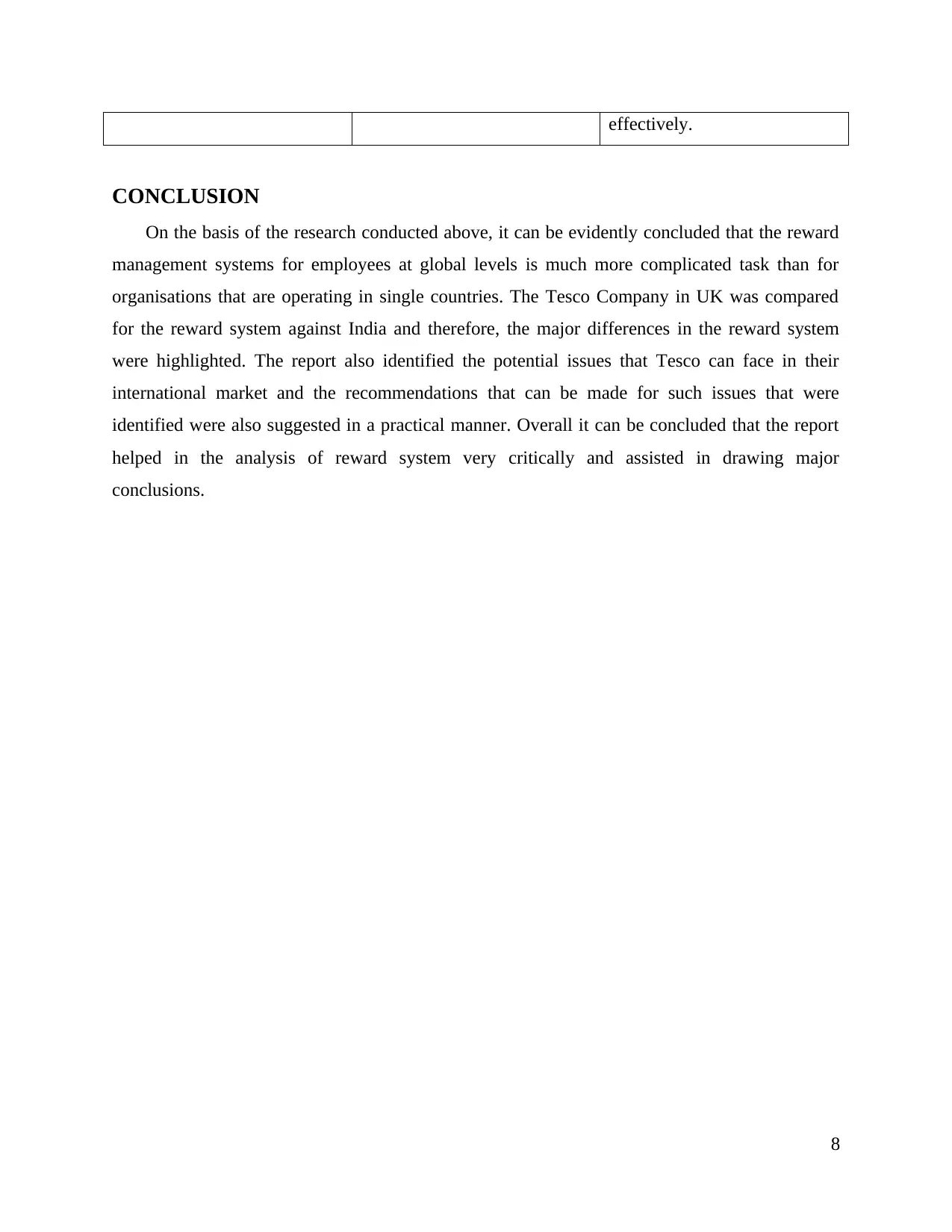
effectively.
CONCLUSION
On the basis of the research conducted above, it can be evidently concluded that the reward
management systems for employees at global levels is much more complicated task than for
organisations that are operating in single countries. The Tesco Company in UK was compared
for the reward system against India and therefore, the major differences in the reward system
were highlighted. The report also identified the potential issues that Tesco can face in their
international market and the recommendations that can be made for such issues that were
identified were also suggested in a practical manner. Overall it can be concluded that the report
helped in the analysis of reward system very critically and assisted in drawing major
conclusions.
8
CONCLUSION
On the basis of the research conducted above, it can be evidently concluded that the reward
management systems for employees at global levels is much more complicated task than for
organisations that are operating in single countries. The Tesco Company in UK was compared
for the reward system against India and therefore, the major differences in the reward system
were highlighted. The report also identified the potential issues that Tesco can face in their
international market and the recommendations that can be made for such issues that were
identified were also suggested in a practical manner. Overall it can be concluded that the report
helped in the analysis of reward system very critically and assisted in drawing major
conclusions.
8
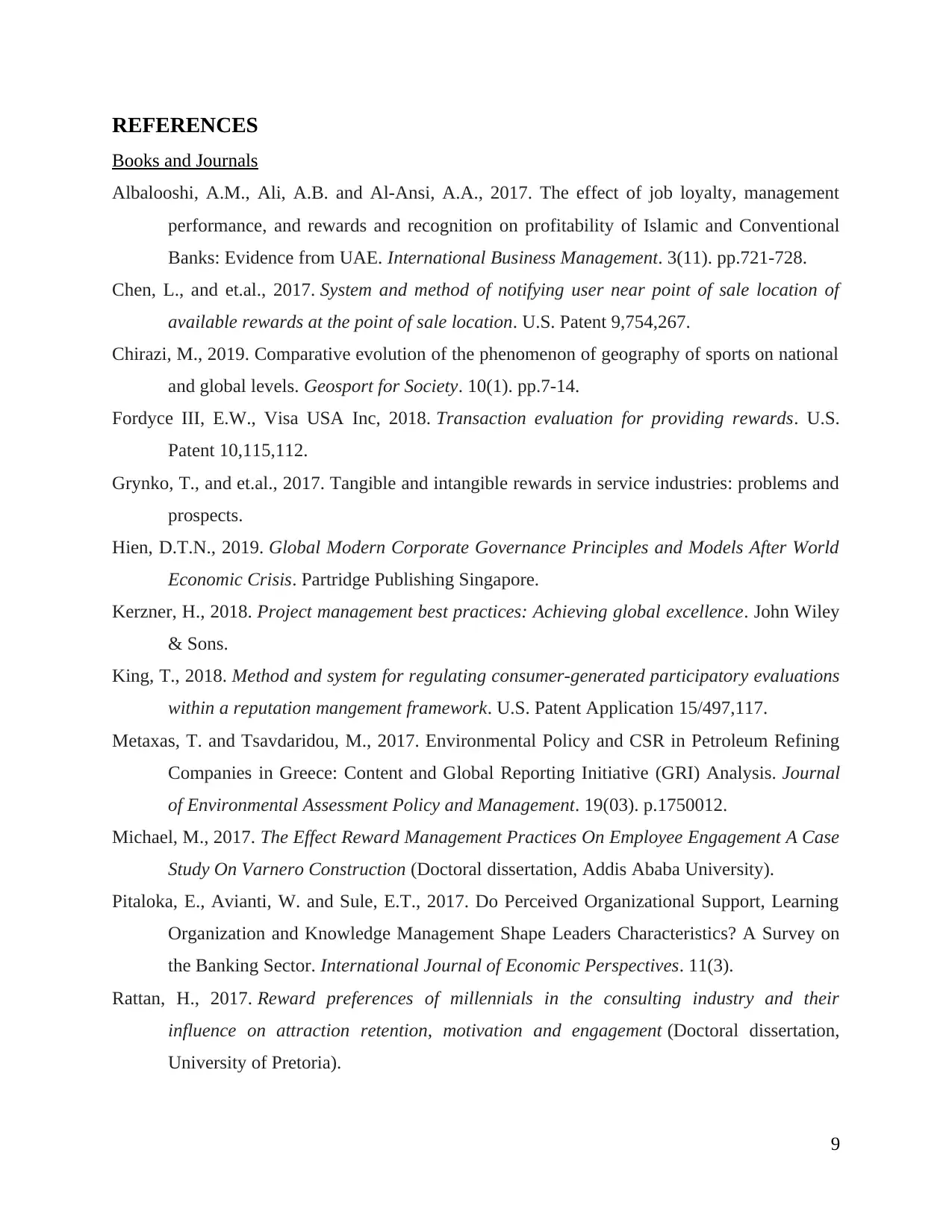
REFERENCES
Books and Journals
Albalooshi, A.M., Ali, A.B. and Al-Ansi, A.A., 2017. The effect of job loyalty, management
performance, and rewards and recognition on profitability of Islamic and Conventional
Banks: Evidence from UAE. International Business Management. 3(11). pp.721-728.
Chen, L., and et.al., 2017. System and method of notifying user near point of sale location of
available rewards at the point of sale location. U.S. Patent 9,754,267.
Chirazi, M., 2019. Comparative evolution of the phenomenon of geography of sports on national
and global levels. Geosport for Society. 10(1). pp.7-14.
Fordyce III, E.W., Visa USA Inc, 2018. Transaction evaluation for providing rewards. U.S.
Patent 10,115,112.
Grynko, T., and et.al., 2017. Tangible and intangible rewards in service industries: problems and
prospects.
Hien, D.T.N., 2019. Global Modern Corporate Governance Principles and Models After World
Economic Crisis. Partridge Publishing Singapore.
Kerzner, H., 2018. Project management best practices: Achieving global excellence. John Wiley
& Sons.
King, T., 2018. Method and system for regulating consumer-generated participatory evaluations
within a reputation mangement framework. U.S. Patent Application 15/497,117.
Metaxas, T. and Tsavdaridou, M., 2017. Environmental Policy and CSR in Petroleum Refining
Companies in Greece: Content and Global Reporting Initiative (GRI) Analysis. Journal
of Environmental Assessment Policy and Management. 19(03). p.1750012.
Michael, M., 2017. The Effect Reward Management Practices On Employee Engagement A Case
Study On Varnero Construction (Doctoral dissertation, Addis Ababa University).
Pitaloka, E., Avianti, W. and Sule, E.T., 2017. Do Perceived Organizational Support, Learning
Organization and Knowledge Management Shape Leaders Characteristics? A Survey on
the Banking Sector. International Journal of Economic Perspectives. 11(3).
Rattan, H., 2017. Reward preferences of millennials in the consulting industry and their
influence on attraction retention, motivation and engagement (Doctoral dissertation,
University of Pretoria).
9
Books and Journals
Albalooshi, A.M., Ali, A.B. and Al-Ansi, A.A., 2017. The effect of job loyalty, management
performance, and rewards and recognition on profitability of Islamic and Conventional
Banks: Evidence from UAE. International Business Management. 3(11). pp.721-728.
Chen, L., and et.al., 2017. System and method of notifying user near point of sale location of
available rewards at the point of sale location. U.S. Patent 9,754,267.
Chirazi, M., 2019. Comparative evolution of the phenomenon of geography of sports on national
and global levels. Geosport for Society. 10(1). pp.7-14.
Fordyce III, E.W., Visa USA Inc, 2018. Transaction evaluation for providing rewards. U.S.
Patent 10,115,112.
Grynko, T., and et.al., 2017. Tangible and intangible rewards in service industries: problems and
prospects.
Hien, D.T.N., 2019. Global Modern Corporate Governance Principles and Models After World
Economic Crisis. Partridge Publishing Singapore.
Kerzner, H., 2018. Project management best practices: Achieving global excellence. John Wiley
& Sons.
King, T., 2018. Method and system for regulating consumer-generated participatory evaluations
within a reputation mangement framework. U.S. Patent Application 15/497,117.
Metaxas, T. and Tsavdaridou, M., 2017. Environmental Policy and CSR in Petroleum Refining
Companies in Greece: Content and Global Reporting Initiative (GRI) Analysis. Journal
of Environmental Assessment Policy and Management. 19(03). p.1750012.
Michael, M., 2017. The Effect Reward Management Practices On Employee Engagement A Case
Study On Varnero Construction (Doctoral dissertation, Addis Ababa University).
Pitaloka, E., Avianti, W. and Sule, E.T., 2017. Do Perceived Organizational Support, Learning
Organization and Knowledge Management Shape Leaders Characteristics? A Survey on
the Banking Sector. International Journal of Economic Perspectives. 11(3).
Rattan, H., 2017. Reward preferences of millennials in the consulting industry and their
influence on attraction retention, motivation and engagement (Doctoral dissertation,
University of Pretoria).
9
You're viewing a preview
Unlock full access by subscribing today!

Saxer, M., Rippa, A. and Horstmann, A., 2018. Asian borderlands in a global
perspective. Routledge Handbook of Asian Borderlands, p.1.
Online
Rewards & benefits. 2019. [ONLINE] Available through :<
https://www.tescounderwriting.com/join-us/benefits-rewards/ >
10
perspective. Routledge Handbook of Asian Borderlands, p.1.
Online
Rewards & benefits. 2019. [ONLINE] Available through :<
https://www.tescounderwriting.com/join-us/benefits-rewards/ >
10
1 out of 10
Related Documents
Your All-in-One AI-Powered Toolkit for Academic Success.
+13062052269
info@desklib.com
Available 24*7 on WhatsApp / Email
![[object Object]](/_next/static/media/star-bottom.7253800d.svg)
Unlock your academic potential
© 2024 | Zucol Services PVT LTD | All rights reserved.





